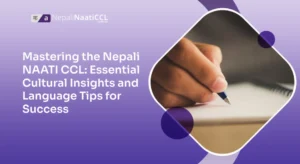Among many options, the NAATI CCL test stands out because of its certification power for individuals to flourish in linguistic careers and earn five Australian PR points. Hence, let’s discuss about ten most important things you didn’t know about the NAATI CCL test.
Likewise, whether you’re a language enthusiast or just dipping your toes into the career field, there are fascinating aspects of the NAATI CCL test that you might have missed. We will explore ten important things that could transform your perception of this test while shedding light on its role in shaping your career and migration opportunities.
Also, contrary to traditional language exams, the NAATI CCL test doesn’t confine you to the pages of a textbook. It simulates real-life scenarios, presenting dialogues that mirror everyday interactions.
In this blog, let’s learn more about the important things you didn’t know about the NAATI CCL test.
NAATI CCL Test Format Overview
The NAATI CCL test assesses your ability to interpret and translate dialogues between two languages accurately and efficiently.
Moreover, this test focuses on real-life situations where you might need to bridge the communication gap between different languages. It’s not just about knowing the words; it’s about understanding their meaning and cultural context.
Likewise, the test consists of two dialogues – one in your native language (Language A) and another in your chosen second language (Language B). These dialogues mimic everyday scenarios, like talking to a doctor or discussing a customer service issue.
You’ll listen to each dialogue and then interpret or translate it into the other language. The test assesses your skills in both interpretations (listening and speaking) and translation (reading and writing).
Similarly, each dialogue is divided into segments, and you’ll have a short pause after each segment to complete your interpretation or translation. The test is timed, so you must work efficiently to finish within the given timeframe.
Also, your responses are scored based on accuracy, fluency, and ability to capture the essence of the conversation. Furthermore, It’s important to convey the meaning accurately while also considering cultural nuances.
Hence, the NAATI CCL test format simulates real-life situations, so it’s a practical assessment of your abilities. By understanding the structure of the NAATI CCL test, you can better prepare and practice to tackle the dialogues and develop daily habits for NAATI CCL success.
10 Important Things You Didn’t Know About the NAATI CCL Test

Several intriguing aspects of the NAATI CCL test might escape your notice. This assessment evaluates your ability to interpret and translate dialogues between languages in practical contexts.
Likewise, the following are ten important things you didn’t know about the NAATI CCL test:
1. Cultural Sensitivity
The NAATI CCL test holds great importance than a mere language assessment. It values your grasp of cultural nuances and evaluates your capacity to convey messages while retaining cultural context.
Moreover, this test is vital in real-life conversations where understanding and respecting diverse cultures is essential for effective communication.
2. Career Opportunities
The NAATI CCL test holds the key to unlocking a plethora of career opportunities. It goes beyond showcasing language proficiency – by assessing your capability to interpret and translate in practical scenarios, it prepares you for linguistic roles across a wide spectrum of fields.
Similarly, Industries like healthcare, legal services, customer support and more often require individuals who can bridge language gaps accurately and sensitively. Your success in the NAATI CCL test positions you as a valuable asset in such professions, where effective communication is vital.
3. PR Points for Migration
Achieving success in the NAATI CCL test brings an unexpected advantage for people trying to migrate to Australia. The test awards you 5 Australian Permanent Residency (PR) points, helping you reach your migration goals.
Also, these points can make a significant difference in your immigration application, as the relevance of the NAATI CCL test is not only in linguistic pursuits but also in your broader life goals.
4. Real-Life Scenario Assessment
Unlike traditional language exams, the NAATI CCL test makes you experience real-life scenarios. It evaluates your capacity to interpret and translate dialogues that mimic everyday interactions.
Also, this practical approach ensures that your language skills are tested in a context that closely resembles actual communication situations. The test focuses on realism and prepares you to navigate spontaneous conversations confidently.
5. Importance of Mediation Skills
Fluency alone doesn’t define success in the NAATI CCL test. The test extends its assessment to your mediation skills – the ability to convey a message accurately between parties while preserving its intended meaning.
Also, mediation adds complexity to the evaluation, as it demands a delicate balance between linguistic precision and cultural empathy. Demonstrating effective mediation showcases your ability to be a conduit of communication that transcends language barriers.
6. Idiomatic Expression Challenges
The NAATI CCL exam tests your capacity to interpret idiomatic expressions thoroughly. Idiomatic expressions are phrases that hold meanings unique to a particular language.
Handling these expressions requires a deep understanding of the language’s intricacies and cultural connotations. Also, by assessing your skill, the test captures how rich you are in idioms interpretation.
7. Multilingual Mediation Challenges
Multilingual contexts often demand specialized skills. The NAATI CCL test recognizes this by evaluating your ability to mediate conversations involving multiple languages.
Moreover, excelling in this aspect showcases your versatility and adaptability in complex linguistic situations.
8. Non-Verbal Communication Proficiency
Communication isn’t just about words – non-verbal cues like gestures, facial expressions, and tone convey meaning. The NAATI CCL test acknowledges the role of non-verbal communication during interaction.
Similarly, the test assesses your ability to accurately interpret and convey these cues, as it recognizes their significance in cross-cultural conversations.
9. Cross-Cultural Taboos and Diplomacy
The NAATI CCL test holds cultural sensitivity as one of the most important assessment factors. The test might challenge you to navigate conversations involving culturally sensitive or taboo subjects.
This demands a diplomatic approach that respects cultural norms while ensuring accurate communication. Hence, your ability to handle such topics with diplomacy adds depth to your proficiency.
10. Technology’s Impact on Language Proficiency
In a rapidly evolving technological landscape, the NAATI CCL test adapts to the influence of technology on language use and communication.
As communication methods evolve, the test evaluates your language proficiency within modern contexts, ensuring everything is relevant in an increasingly interconnected world. Hence, you must be aware of the crucial steps to make your NAATI CCL test successful.
NAATI CCL Test vs. Traditional Language Exams
The comparison between the NAATI CCL test and traditional language exams reveals the different approaches to assessing language proficiency. While both evaluate language skills, they do so in ways that cater to different aspects of communication.
On one hand, traditional language exams often focus on grammar, vocabulary, and reading comprehension through isolated exercises and structured questions. These exams primarily test your understanding of language rules and your ability to construct grammatically correct sentences.
On the other hand, the NAATI CCL test places a spotlight on practical communication. It assesses your ability to interpret and translate dialogues that mirror real-life interactions. Instead of isolated questions, the test presents contextual scenarios, mimicking conversations you might encounter daily.
Moreover, this approach measures both your language skills and your adaptability to spontaneous communication, where grasping cultural context and accurately conveying messages are very important.
Another significant distinction lies in the evaluation of cross-cultural communication. Traditional exams often emphasize language correctness without any attention to cultural nuances. In contrast, the NAATI CCL test recognizes the vital connection between language and culture.
It values your capacity to understand and convey messages with cultural sensitivity. This aspect is particularly relevant in today’s globalized world, where effective communication extends beyond words.
Also, the NAATI CCL test tests your mediation skills, which are crucial in multicultural settings. It assesses your capability to relay messages accurately between parties while retaining the intended meaning. This goes beyond the scope of traditional exams, which often center on individual language proficiency.
6 Best Strategies for NAATI CCL Success

Achieving success in the NAATI CCL test requires strategic preparation. Moreover, you can measure your readiness for interpreting and translating dialogues with precision and cultural sensitivity.
These six strategies will help you develop effective techniques for navigating the test’s challenges.
1. Practice with Diverse Scenarios
Engaging in practice sessions that explore various test scenarios is essential. By engaging yourself in a wide range of contexts – from medical consultations to customer service interactions – you develop the flexibility to handle different conversation topics that might arise during the test.
Also, this familiarity with diverse scenarios enhances your confidence and equips you to navigate the test’s challenges effectively.
2. Cultural Context Understanding
When you think of going beyond the surface of language, dive into the cultural context of the dialogues. This involves understanding cultural nuances, idiomatic expressions, and the impact of cultural differences on communication.
Moreover, incorporating the cultural dimension into your interpretations makes your messages resonate accurately across cultures.
3. Importance of Time Management
Nothing compares to the importance of efficient time management. Hence, you must practice tasks, focusing on completing them within the allocated time frame.
Similarly, this alleviates potential stress during the assessment and ensures you can dedicate sufficient attention to each test segment.
4. Regular Vocabulary Enhancement
Consistently expanding your vocabulary in both languages will be the key to your success. Learning words relevant to different scenarios enhances your ability to interpret and translate effectively.
Also, a diverse vocabulary will help you accurately convey messages, capturing the nuances of each dialogue and adapting to various conversation topics.
5. Practice Active Listening
Cultivate active listening skills by improving your ability to understand the meaning behind spoken words. This involves capturing the emotions, context, and intent conveyed through tone and inflection.
Moreover, Active listening helps you interpret dialogues accurately, ensuring that your responses capture the essence of the message beyond just the words.
6. Cultural Sensitivity Sensibility
Developing cultural sensitivity is a vital component. This strategy entails familiarizing yourself with cultural norms, values, and potential taboos. Doing so ensures that your interpretations are linguistically accurate and culturally respectful.
Likewise, this sensitivity improves your cross-cultural communication, allowing you to bridge language gaps.
Conclusion
As we’ve dived into the NAATI CCL test’s hidden layers, we’ve discovered it’s more than just a language test. It’s an abundance of opportunities – not just for jobs but also for moving to Australia.
This test is like a snapshot of real life, where you have to talk and understand people from different places. However, its importance doesn’t stop there – it holds the potential to pave the path to Australian Permanent Residency, a remarkable advantage for those who dream of making Australia their new home.
Moreover, what further reinforces the test’s significance is its resonance in the modern world as the latest technology and cultural diplomacy influence it.
Furthermore, for those seeking guidance in navigating the complexities of the NAATI CCL test, look no further than NepaliNAATICCL. We are an online portal that is a reliable source for all queries regarding the NAATI CCL Online Test.
It provides a space to clear doubts and offers comprehensive NAATI CCL course materials and NAATI CCL mock tests. Moreover, free NAATI CCL test samples on the portal provide a sneak peek into the structure and demands of the test.
As you decide to start your preparation for the NAATI CCL test, NepaliNAATICCL can be your perfect companion throughout.
Happy Learning!!
FAQ
Q.1: Can you tell me more about how the NAATI CCL helps in jobs?
Sure! When you pass the NAATI CCL test, you’re ready for many types of jobs like healthcare or law. It’s like having a key that opens doors to different careers.
Q.2: How does the NAATI CCL test connect to moving to Australia?
Passing the NAATI CCL test gives you five PR points to apply for Australian permanent residency. These points are like a golden ticket that makes it easier to become a permanent resident there.
Q.3: How does the NAATI CCL test differ from other language tests?
The NAATI CCL test is about more than just about knowing words. It’s about talking in real-life situations, like visiting the doctor or talking to a customer. It’s more practical.
Q.4: Can you explain why cultural understanding matters in the NAATI CCL test?
Of course! Understanding different cultures is like understanding what people mean, not just what they say. This test checks if you can do that.
Q.5: What’s the secret to doing well in the NAATI CCL test?
The secret is to practice a lot and know how to manage your time. Also, remember to listen carefully and understand the cultural side of things.




